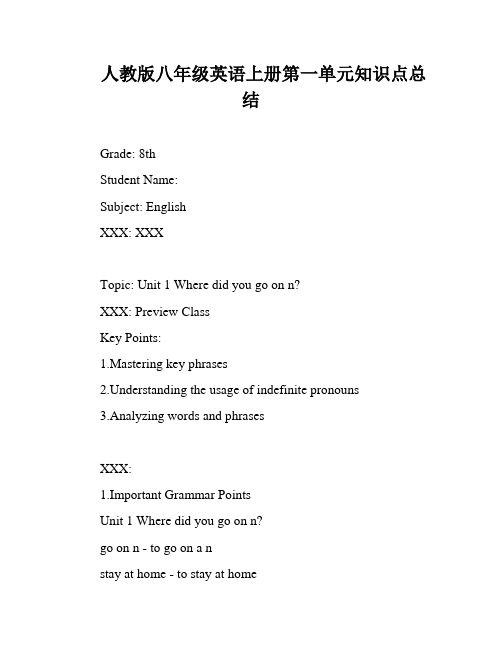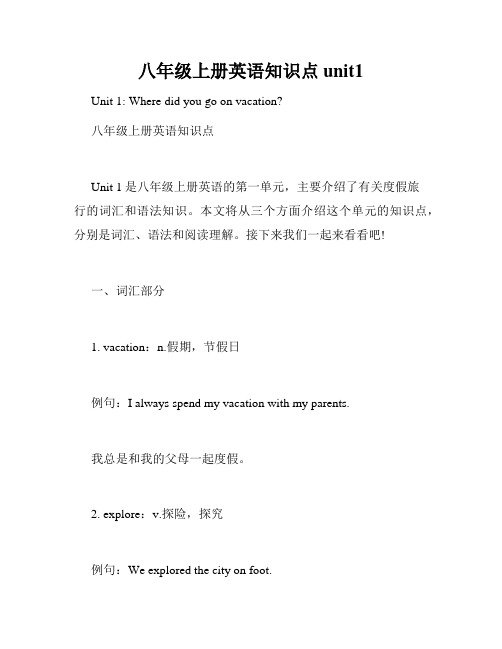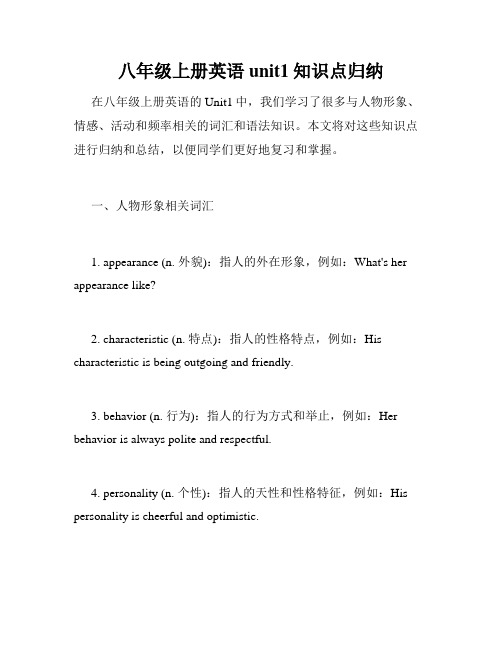八年级英语上册第一单元知识点总结
人教版八年级英语上册第一单元知识点总结

人教版八年级英语上册第一单元知识点总结Grade: 8thStudent Name:Subject: EnglishXXX: XXXTopic: Unit 1 Where did you go on n?XXX: Preview ClassKey Points:1.Mastering key phrases2.Understanding the usage of indefinite pronouns3.Analyzing words and phrasesXXX:1.Important Grammar PointsUnit 1 Where did you go on n?go on n - to go on a nstay at home - to stay at homego to the mountains - to go mountain climbing go to the beach - to go to the beachvisit museums - to visit museumsquite a few - quite a lotstudy for - to study formost of the time - most of the timetaste good - taste goodhave a good time - to have a good timefeel like - to feel likego shopping - to go shoppingwalk around - to walk aroundbecause of - because ofone bowl of - one bowl ofthe next day - the next dayfind out - to find outgo on - to continuetake photos - to take photossomething important - XXXup and down - up and downcome up - to come upbuy sth。
英语人教版八年级上unit1知识点笔记

Un i t 1 Wh e re d id yo u g o on v acation?1•一般过去时考点1:如何判断一般过去时?考点2:肯定句变否定句。
考点3:变一般疑问和特殊疑问句。
2•复合不定代词/副词构成: _________ _________ ___________ _________其中:(no one意思“______ ”指 __ ,与_________ 同义,且与of连用,做主语谓语用单三。
回答引起的特殊疑问句时要用no one.none意思“ ___ ”,指____________ ,且 __ 与of连用。
谓语单,复形式皆可。
回答 _________ 引起的特殊疑问句时要用none;-anyone意思" _____ ”扌旨___ ,与 __ 同义,且_____ 与of连用。
_any one 意思" ____ ”扌旨___ ,与 __ 同义,且_____ 与of 连用。
nothing= _________________用法:① 复合不定代词做主语,谓语动词用 ________ •②当adj.修饰不定代词要_________ •③ 当不定代词中含有some通常用于__________ ;含有any通常用于_______________我自己myself你自己他自己她自己它自己我们自己你们自己他们自己反身代词在句中可用作动词宾语、介词宾语、表语和同位语等,如:She can dress herself.作动词宾语)That?poor?boy?was?myself.(用作表语)Thefatherhimselfhassomething wrong.(同位语:句中常置于名词、代词之后或句子末尾We clean the room ourselves.(同位语:句中常置于名词、代词之后或句子末尾常用短语:穿衣服;?玩得快乐;随便吃;随便用;2.few 意为___________,修饰__________ 名词,倾向于否定。
八年级上册英语知识点unit1

八年级上册英语知识点unit1Unit 1: Where did you go on vacation?八年级上册英语知识点Unit 1是八年级上册英语的第一单元,主要介绍了有关度假旅行的词汇和语法知识。
本文将从三个方面介绍这个单元的知识点,分别是词汇、语法和阅读理解。
接下来我们一起来看看吧!一、词汇部分1. vacation:n.假期,节假日例句:I always spend my vacation with my parents.我总是和我的父母一起度假。
2. explore:v.探险,探究例句:We explored the city on foot.我们步行探索这座城市。
3. destination:n.目的地,终点例句:Australia is a popular tourist destination.澳大利亚是一个受欢迎的旅游目的地。
4. sightseeing:n.观光,游览名胜例句:We went sightseeing and took a lot of pictures.我们观光了不少景点,并拍了很多照片。
5. souvenir:n.纪念品,纪念物例句:I bought a souvenir for my sister from Japan.我从日本给我妹妹带了一个纪念品。
二、语法部分1. 过去式的构成形式1) add –ed:walk -> walked;play -> played2) 变化规则:一般情况下,单词末尾是辅音字母+y,变y为i,再加-ed:study -> studied;try -> tried3) 不规则过去式(常用的不规则动词):go -> went;buy -> bought;have -> had;eat -> ate2. 一般过去时的用法表示过去某个时间发生的事情。
常与表示过去的时间状语连用。
例如:yesterday,last night,last week,last month等。
(完整版)八年级上册第一单元英语语法、短语和知识点总结

八年级上册英语语法、短语和知识点总结Unit 1 Where did you go on vacati on?本单元的话题:谈论假期活动内容,复习一般过去时。
本单元的语法:1.复习一般过去时;2•学习不定代词和不定副词的用法。
语法: 1•本单元出现的动词不规则过去式有:is\am---was 是;are -- were 是;go---went 去;buy —bought买;take ---took拿走;do\does —did 做;feed—fed喂;see —saw看见;eat --ate 吃;have\has —had 有、吃;feel -felt 感觉;ride —rode 骑;get --got 到达,得到;can — could 能、会;forget —forgot 忘记;drink —drank 喝;find —found 找到2. 不定代词和不定副词的用法:some bodyany oneevery thingno where (疑问副词)不定代词和不定副词(1)左边的some、any、every、no 与右边的body、one、thing 构成不定代词,some、any、every、no与右边的疑问副词where 构成不定副词;(2)—般情况下以some开头的不定代词和不定副词用于肯定句,以any开头的不定代词和不定副词用于否定句、疑问句;以no开头的不定代词和不定副词表示否定含义(no one为两个单词);(3)不定代词或不定副词和形容词连用时,形容词放在后面。
He has something important to do. 他有重要的事情要做。
(肯定句用something,形容词important 放后)Did you buy anything special?(一般疑问句用anything,形容词special放后)Did you go any where interesting last mon th? 上个月你去令人感兴趣的地方了吗?(一般疑问句用不定副词anywhere,形容词interesting 放后)(4)不定代词和不定副词做主语时,后面的动词用单数形式。
人教版新目标八年级英语上册1、2、3、4单元知识点总结

⼈教版新⽬标⼋年级英语上册1、2、3、4单元知识点总结新⽬标⼋年级英语上册第⼀单元Unit 1.How often do you exercise?I. 重点短语归纳:on weekends 在周末1. go to the movies 去看电影2. look after=take care of 照顾、照看3. surf the internet 上⽹4. healthy lifestyle 健康的⽣活⽅式5. go skateboarding 去滑滑板watch TV看电视6. keep healthy=stay healthy = keep in good health 保持健康keep + 形容词表保持某种状态do some reading 阅读7. exercise= take/do (much) exercise=do sports锻炼8. eating habits 饮⾷习惯9. take more exercise 做更多的运动10. the same as 与什么相同11. once a month⼀⽉⼀次12. be different from 不同13. twice a week⼀周两次.three times a week⼀周三次14. make a difference to 对什么有影响As teachers, you must believe that you can make a difference to the lives of your students. ⾝为教师,你们必须坚信你们能够影响学⽣的⼀⽣。
A false step will make a great difference to my future.错⾛⼀步对我的前程来说会产⽣很⼤影响。
15.how often 多久⼀次,询问动作发⽣的频率⼀般⽤once a week ,twicea month ,every day ,sometimes等回答。
八年级上册英语unit1知识点总结归纳

八年级上册英语unit1知识点总结归纳英语作为一门外语,学习难度较大,需要不断积累知识才能提高自己的英语水平。
本文将对八年级上册英语Unit1的知识点进行总结归纳,帮助学生更加有效地进行学习。
一、单词1.名称2.年龄3.国籍4.语言5.职业这些单词是在Unit1中需要了解并掌握的重要词汇,它们可以帮助学生在日常对话中更加流畅地表达自己的意思。
同时,学生还需要在学习过程中注意各单词的发音和拼写,确保自己掌握了正确的单词运用方法。
二、语法1.介绍他人的时态:be动词+形容词当学生需要介绍他人时,需要使用be动词加上一个形容词来进行描述。
例如:She is my sister. (她是我的姐姐。
)学生需要在学习中对这种语法结构进行理解和掌握,以便在日常交流中运用自如。
2. 教室用语:There is / are…在日常教室中,学生会用到许多教室用语,如:There is a book on the desk. (桌子上有一本书。
)在学习中,学生需要理解这种语法结构的含义,以便自己进行正确的表达。
三、口语表达1.自我介绍当学生需要进行自我介绍时,需要准确地使用语音和语调,使自己的话语更加流畅自然。
学生需要注意各单词的发音和重音,以便自己的表述更加准确、自然。
2. 问候语在日常交流中,学生需要使用各种问候语,如:Good morning/ afternoon.(早上好 / 下午好。
)通过学习这些问候语,学生可以更加流畅自然地进行日常交流。
四、听力理解在本单元听力练习中,学生可以加强自己的听力理解能力。
学生需要使用耳朵仔细聆听,并通过理解上下文的内涵来推断和解析整个语境。
在学习中,学生可以通过听力训练来提高自己的听力理解能力,以便更好地理解英语。
五、总结学生需要在学习中充分理解和掌握Unit1的知识点,积极参与课堂讨论和听力练习,以提高自己的英语能力。
同时,学生需要加强对英语单词的记忆和掌握,以便在日常使用中更加熟练自如。
八年级上册英语第一单元知识点总结

八年级上册英语第一单元知识点总结一、单词•Vocabulary: words or expressions used in an English language lesson or conversation.•Verbs: words that denote actions, occurrences, and states of being.–Example:run, eat, play•Nouns: words that refer to people, places, things, or ideas.–Example:dog, school, happiness二、语法•Grammar: rules governing the structure of language.–Example:subject-verb agreement, tenses•Parts of Speech: categories to which words can be assigned based on their functions in a sentence.–Examples:nouns, verbs, adjectives三、句型•Sentence Structures: various ways in which words are arranged to form sentences.–Example:subject-verb-object (SVO) structure•Simple Sentences: sentences containing one independent clause.–Example:She sings.•Compound Sentences: sentences containing two or more independent clauses.–Example:She sings, and he dances.四、听力•Listening Skills: ability to understand spoken language accurately.–Example:identifying main ideas, supporting details •Note-taking: technique for recording key points during listening exercises.五、阅读•Reading Comprehension: understanding and interpreting written texts.–Example:answering questions based on a passage•Context Clues: hints within a text that help determine the meaning of unfamiliar words.六、写作•Writing Skills: ability to express thoughts and ideas coherently in written form.–Example:essays, letters, reports•Paragraph Structure: organization of sentences into coherent paragraphs.–Example:topic sentence, supporting details七、口语•Speaking Skills: ability to articulate words and express ideas fluently in conversation.–Example:introducing oneself, asking for directions•Pronunciation: correct articulation of sounds in English words.八、课堂活动•Classroom Activities: tasks and exercises conducted in the English classroom.–Example:role-playing, group discussions•Pair Work: collaborative activities between two students to practice language skills.以上是八年级上册英语第一单元的知识点总结,希望对你的学习有所帮助。
八年级上册英语unit1知识点归纳

八年级上册英语unit1知识点归纳在八年级上册英语的Unit1中,我们学习了很多与人物形象、情感、活动和频率相关的词汇和语法知识。
本文将对这些知识点进行归纳和总结,以便同学们更好地复习和掌握。
一、人物形象相关词汇1. appearance (n. 外貌):指人的外在形象,例如:What's her appearance like?2. characteristic (n. 特点):指人的性格特点,例如:His characteristic is being outgoing and friendly.3. behavior (n. 行为):指人的行为方式和举止,例如:Her behavior is always polite and respectful.4. personality (n. 个性):指人的天性和性格特征,例如:His personality is cheerful and optimistic.5. occupation (n. 职业):指人的职业,例如:What's your occupation?二、情感相关词汇1. feeling (n. 感觉):指人的感觉和情感,例如:I have a good feeling about this.2. emotion (n. 情感):指更强烈的感情反应,例如:The news filled her with emotions of happiness and relief.3. mood (n. 心情):指人的心情状态,例如:What mood are you in today?4. express (v. 表达):指用语言、动作等方式表达情感或思想,例如:He expressed his gratitude to the team.5. attitude (n. 态度):指个体对事物的看法和评价,例如:His attitude towards the assignment was positive.三、活动相关词汇1. relax (v. 放松):指缓解压力或紧张状态,例如:I like to relax by taking a hot bath.2. exercise (n. 锻炼):指身体运动,例如:Regular exercise is good for your health.3. hobby (n. 爱好):指喜欢的活动或娱乐方式,例如:My hobby is reading.4. entertainment (n. 娱乐):指各种形式的娱乐活动,例如:Cinema is a great form of entertainment.5. travel (v. 旅游):指外出旅行,例如:I love to travel to different countries.四、频率相关词汇1. sometimes (adv. 有时):指在某些时间发生或出现,例如:I sometimes forget to do my homework.2. often (adv. 经常):指发生的频率比较高,例如:I often go swimming on weekends.3. rarely (adv. 很少):指极少数的频率,例如:I rarely eat fast food.4. always (adv. 总是):指经常发生或持续存在,例如:I always wake up early in the morning.5. never (adv. 从不):指完全不发生,例如:I never drink coffee before sleeping.五、语法知识1. 一般现在时:表达现在的事实和习惯,例如:I often go to the gym.2. 现在进行时:表达正在进行的动作,例如:She is reading a book.3. 物主代词:表示所有者或归属关系,例如:That book is mine.4. 介词短语:表示时间、地点、方式等词语的组合,例如:I study English in the library.5. 比较级:表示两个事物之间的比较关系,例如:My car is faster than yours.综上,八年级上册英语Unit1的知识点涵盖了人物形象、情感、活动和频率等方面的词汇和语法知识。
- 1、下载文档前请自行甄别文档内容的完整性,平台不提供额外的编辑、内容补充、找答案等附加服务。
- 2、"仅部分预览"的文档,不可在线预览部分如存在完整性等问题,可反馈申请退款(可完整预览的文档不适用该条件!)。
- 3、如文档侵犯您的权益,请联系客服反馈,我们会尽快为您处理(人工客服工作时间:9:00-18:30)。
第 1 页 共 5 页 课 题 Unit1 Where did you go on vacation? 教 学 内 容 Unit1 Where did you go on vacation? 一、书本重要语法点梳理 go on vacation去度假 stay at home待在家里 go to the mountains去爬山 go to the beach去海滩 visit museums 参观博物馆 go to summer camp去参观夏令营 quite a few相当多 study for为……而学习 go out出去 most of the time大部分时间 taste good尝起来很好吃 have a good time玩得高兴 ]of course当然 feel like给……的感觉;感受到 go shopping去购物 in the past在过去 walk around四处走走 because of因为 one bowl of… 一碗…… the next day第二天 drink tea喝茶 find out找出;查明 go on继续 take photos照相 something important重要的事 up and down上上下下 come up出来 buy sth. for sb. / buy sb. sth.为某人买某物 taste + adj. 尝起来…… seem+(to be)+ adj. 看起来…… arrive in+大地点 / arrive at+小地点 到达某地 decide to do sth.决定去做某事 try doing sth.尝试做某事 try to do sth.尽力去做某事 forget doing sth.忘记做过某事 forget to do sth.忘记做某事 enjoy doing sth.喜欢做某事 want to do sth.想去做某事 start doing sth.开始做某事 stop doing sth. 停止做某事 dislike doing sth. 不喜欢做某事 keep doing sth.继续做某事 Why not do. sth.?为什么不做……呢?so+adj.+that+从句 如此……以至于…… tell sb. (not) to do sth. 告诉某人(不要)做某事
1. on vacation 度假 vacation意为“假期、假日”,相当于holiday,但vacation表示长的假期。如: the long vacation 长假 the summer vacation 暑假 the Christmas vacation 圣诞假期 而holiday(尤其美国)指“假日;休息日;休假”。 on vacation = on holiday 意为“度假” 第 2 页 共 5 页
2. anything interesting 一些有趣的东西 1)something,anything,nothing,everything是指物的不定代词。somebody,someone,anybody,anyone,nobody,everybody,everyone是指人的不定代词。somewhere,anywhere,nowhere,everywhere是指地点的不定代词。 2)当形容词修饰something, anything, nothing, everything等不定代词时,放在这些词的后面; 3)这些不定代词做主语时,谓语动词用第三人称单数。如: Is everybody here? 大家都到齐了吗? 4)something,somebody,someone,somewhere用于肯定句及表示请求或建议的疑问句中,而anything,anybody,anyone,anywhere用于否定句及疑问句中。如: Did you do anything interesting? 你做了有趣的事吗?(表疑问) Why don’t you visit someone with me? 你为什么不跟我一起去拜访下某个人呢?(表建议)
3. buy sth. for sb. 或 buy sb. sth 如:My parents often buy some books for me. = My parents often buy me some books. 我父母经常给我买书。
4. 提建议的句子: ①What/ how about +doing sth.? 如:What/ How about going shopping? ②Why don’t you + do sth.? 如:Why don’t you go shopping? ③Why not + do sth. ? 如:Why not go shopping? ④Let’s + do sth. 如: Let’s go shopping ⑤Shall we/ I + do sth.? 如:Shall we/ I go shopping?
5. long time no see 好久不见 6. quite a few 相当多 a few 与 a little 的区别,few 与 little 的区别 ⑴ a few 一些 修饰可数名词 a little 一些 修饰不可数名词 两者都表肯定意义 如:He has a few friends. 他有一些朋友。 There is a little sugar in the bottle. 在瓶子里有一些糖。 ⑵ few 少数的 修饰可数名词 little 少数的 修饰不可数名词 但两者都表否定意义 如:He has few friends. 他没有几个朋友。 There is little sugar in the bottle.在瓶子里没有多少糖。
7. most of … …的大多数 如:most of the time 大多数时间 8. Still no one seemed to be bored. 仍然没有人感到烦闷。 1)seem意为“好像;似乎;看来”,是个连系动词,构成的短语有: 第 3 页 共 5 页
seem to do sth. 好像做某事 如: They seem to talk in class. 他们似乎上课说 话。 seem(to be)+adj. 似乎...... 如: He seemed ( to be) ill yesterday. 昨天他似乎 病了。 It seems that + 从句 似乎...... 如: It seems that he was ill yesterday. 昨天他似 乎病了。 2) bored 作形容词,意为“烦闷的;厌倦的”其主语是某人; 而boring 也是形容词,其主语是某物。 如: My parents ask me to do homework all day. I feel bored.我父母整天叫我做作业, 我感到很厌倦。 Doing homework all day is a little boring. 整天做作业有点无聊。 相类似的词语还有: interested adj. 感兴趣的 interesting adj. 有趣的 surprised adj. 感到惊奇的 surprising adj. 惊奇的 tired 累的 tiring 令人疲惫的 excited 兴奋的 exciting 令人兴奋/激动的 amazed 惊讶的 amazing 令人惊讶的
9. 辨析: get to/reach/arrive 牢记: 相同点:都是“到达“的意思 不同点:get to+地点/reach+地点 arrive at+小地点(车站等)/arrive in+大地点(国家等) 注意:若他们后面要加地点副词here,there,home等,则不需要加介词。
10. enjoy doing sth . 喜欢做…乐意做… 如:She enjoys playing football. 她喜欢踢足球。 enjoy oneself 过得愉快 如:He enjoyed himself. 他过得很愉快。 跟它意思相近的词组还有have a good \ great time , have fun。
11. decide 意为“决定”,是动词。它的名词形式为decision。构成的短语有: decide to do sth. decide on doing sth. 决定做某事 make a decision to do sth. 决定不要做某事,要用decide not to do sth.。 如:Li Lei has decided to go to Beijing . 李雷已经决定去北京。
12. nothing...but...意为“除......之外; 只有”,如: I have nothing to do but watch TV all day long. 我整天除了看电视什么也没干。
13 . feel like 意为:“有什么感觉;感受到”,后跟宾语从句。另外,构成短语 feel like 第 4 页 共 5 页
doing sth.意为“想做某事”。如: I felt like I was a bird. 我感觉我是一只鸟。 I feel like eating.我想吃东西。
14. because of , because: because of + 名词/代词/名词性短语 如:I had to move because of my job. 因为工作的原因我得搬家。 because + 从句 如:I do it because I like it. 我做这件事是因为我喜欢。
15. below意为“在......下面”,其反义词为 above,意为“在......上面” 16. bring sth.to +地点,意为“带来”,其反义词是take。如: Please bring your book to our school. 请把你的书带到我们学校来。 Please take your book to your school. 请把你的书带到你的学校去。
17.enough 足够 形容词+enough 如:beautiful enough 足够漂亮 enough+名词 如:enough food 足够食物 enough to 足够…去做… 如:I have enough money to go to Beijing. 我有足够的钱去北京。 She is old enough to go to school. 她够大去读书了。
